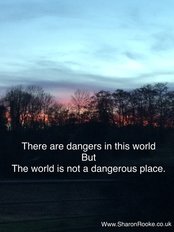|
24/3/2017 1 Comment Everyone Loves A Drama It's true, is't it that everyone loves a drama. We can easily get caught up in the excitement, the buzz, the thrill of the drama. The energy it creates can break us out of the dull-drum. Suddenly there's something or someone to focus on. Finding out about what's happening, or happened, or about to happen feeds into our natural curiosity. But at what cost? When I was learning psychotherapy, many many years ago now, I was introduced to Karpman's Drama Triangle; from Transactional Analysis. To say I didn't welcome this model with open arms would be an understatement. I went into my own 'stuff' - very technical term, big time. There may even have been a little temper tantrum of two, to be fair. There are 3 positions in the drama triangle; The Persecutor - I'm out to get you; The Rescuer - I'm out to save you; The Victim - they're going to get me, save me. In the good old dramas the roles are clear cut. Take Harry Potter, in the very first scene of the first movie the roles are established; Harry Potter is the victim to Voldemort, thank goodness for Dumbledore. Then as the story progresses and the plot becomes more complex, because life is like that, roles swap over. In our daily life we inadvertently or unconsciously take on these roles or states. When taken on without question, review or reflection these can lead to one of the most restrictive beliefs. States becomes Traits We are always meant to be more, we are always meant to adapt, to grow, to evolve. But in the exercise, all those years ago, I was stuck. The persecutor was well known to me in my past but no longer fitted. The rescuer brought me out in cold sweats, putting my big pants on the outside was a big no no! The victim was out of the question; the rule of 'we fight in this family' was well and truly embedded. So where to next. The model shows the Adult. The optimum role, the place to be. This is outside of the drama triangle. From this safe place we can not be pulled into these states, whereby we are at the mercy of others. So in the exercise, where we were asked to play out the role, I took the Adult role...or did I? Really? Nah! I wasn't in Adult, I was guarding myself with a pretend Adult. This involved putting up barriers, not saying what i would like to say. Because I didn't think the relationship I had with the others that were playing, was strong enough to take even a light-hearted little role play. There wasn't the trust there, there was too much self-conscientiousness whilst being watched and assessed. Adding to by the feedback that 'Adult is boring' But staying outside of the drama is different to being adult, and being adult is not boring but acting adult is. So what can we do. Well this is a lifelong process, thankfully. This is an aim along the journey, not a destination. So be kind to yourself. If you recognise that you're triggered into one of these states start to notice...notice which state you've defaulted in...notice your behaviours (sometimes it can be easier for us to notice others' behaviours and our responses to them)...notice your feelings (the ones on the surface and the ones below them, they can offer great insights)...notice which buttons are being pressed (they will have rules attached to them)...notice that space that lingers between the stimulus and response. In this space is your creative zone, this is the land of choice, where you can locate your resources. I will sign off using the beautiful words of Virginia Satir... "And now again, become aware of what we always have with us; our resources - our ability to see and hear and touch and taste and smell and feel and think and move and speak and choose. All of these were given to us because we are human beings. these are our resources that take us anywhere we go. therefore, wherever we go we are always well equipped. Our job is to access and connect with and learn to use these wonderful resources." Visit www.SharonRooke.co.uk/courses for dates of the next courses to help you to learn, change and grow.
1 Comment
|
Archives
October 2019
AuthorSharon Rooke Categories |
Search by typing & pressing enter

